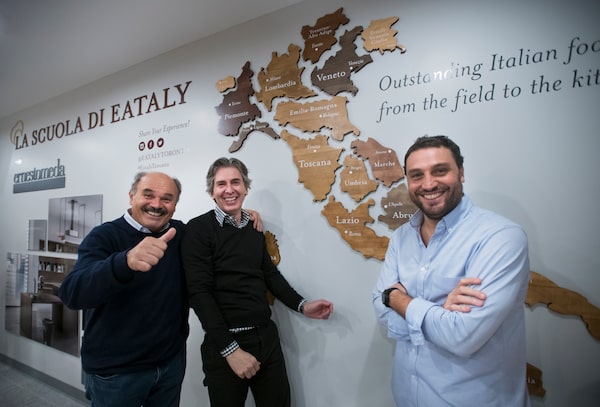
From left: Oscar Farinetti, founder of Eataly; Tony Grossi, president of Wittington Properties; and Nicola Farinetti, CEO of Eataly North America.Fred Lum
Sylvain Charlebois is a professor of food distribution and policy, and director of the Agri-Food Analytics Lab, at Dalhousie University.
The Eataly chain is like no other in food retailing. It’s an Italian-only food court on steroids: nine restaurants, a cooking classroom, a wine bar, a brewpub, a grocery area and even a mozzarella-making counter, all in one spot. After opening its first outlet less than 12 years ago, its first Canadian location opens in Toronto on Nov. 13.
Like other locations, the Toronto Eataly, which will be the chain’s 40th store, will be almost 50,000 square feet and will employ more than 300 people. It’s a massive food emporium, celebrating the best flavours and tastes Italy has to offer, but with a twist of domestic savoir faire.
Read more: A sneak peak at Toronto's soon-to-open Eataly
While some ingredients come from Italy, many are procured in the Toronto area where Italian cuisine has been well-established since the beginning of the 20th century. Many of the new location’s employees have had special Italian-style training as well, so it’s easy to imagine how service quality is very much a focus for the chain.
The philosophy of the Italian chain founded by Oscar Farinetti is based on three fundamental pillars: eating, shopping and learning. Customers visiting Eataly are immediately exposed to something unique as soon as they enter the store.
Once you look at seasonal fruits and vegetables, Eataly’s labyrinth of smells and colours will draw you into the delicatessen portion where a large assortment of marinades, condiments and olive oils will await you; in fact, Eataly was inspired by the great bazaars of Istanbul. Everything is prepared on location, including tortellini, spaghetti and many more types of pasta. Abundance is not only on the menu, it’s everywhere. You can buy these pastas or taste them on the spot in one of the four restaurants, all while sipping Italian wine or a gourmet coffee of your choice.
But Toronto already has more than 10,000 food-service outlets and more than 400 grocery stores. The number of restaurants have been increasing by more than 3 per cent a year since 2017. Even with the support of the Weston family (which owns Loblaws), it’s unclear if the store will be successful. Loblaws’ Maple Leaf Gardens store has been in operation for quite some time in downtown Toronto, and the Westons can certainly bring some important knowledge to the table – no pun intended. But the Maple Leaf Garden store is very much a larger grocery store with pizzazz. Eataly’s model is distinctively different.
The store will also be in what is known as the “Mink Mile” in Toronto. A lot of money is spent in that district, and although most shoppers in the area are hard-wired to pay a premium for anything and everything, it won’t be for everyone’s pocketbook, or at least not for everyone to visit every single day.
Toronto, in recent years, has changed to become more of a culinary destination, a real contender for other major international cities. It is much more exciting than ever before, offering a variety of different food experiences. But Toronto is also about fashion, fly-by-night food trends and ridiculous temporary stylish fixations. And Toronto is not known to harbour millions of consumers wanting to pay up for food. Countless consumer surveys on food consumption have shown that Torontonians are bargain hunters. The average household in the Greater Toronto Area spends barely 7 per cent of its budget on food, compared to well over 13 per cent in Quebec and British Columbia. In Canada’s largest city, discounting is the key to any grocer’s success. And the competition is already quite stiff.
For Eataly, part of its success will be to get the Italian community engaged. The Greater Toronto Area is home to almost half a million people of Italian descent, but less than 200,000 live in the downtown core. Montreal, on the other hand, is home to almost 300,000 people of Italian descent, and most of them live on the island. Eataly intends to open a store in Montreal, but given the culture there for food and how the economy is thriving these days, one must wonder why they aren’t opening the country’s first Eataly store in Montreal to start.
Eataly is about wanting to eat Italian. Who doesn’t? But a visit will take time and money. Eataly’s message focuses on savouring the best of what food can offer. It’s worth a visit and let’s hope it does well. But Italy’s food experience maestros will face major headwinds in Toronto once all the initial hoopla is over.